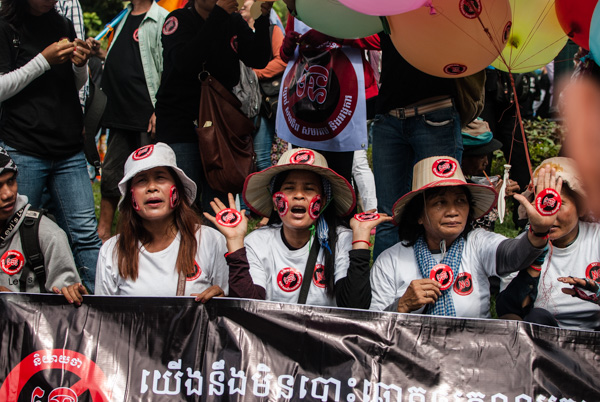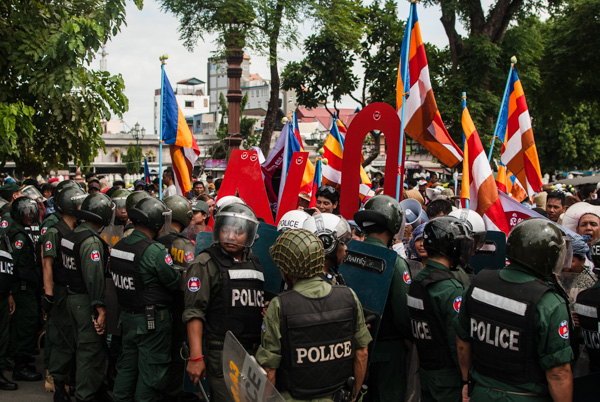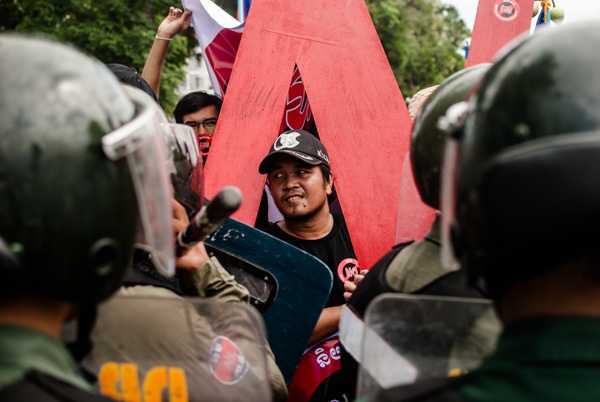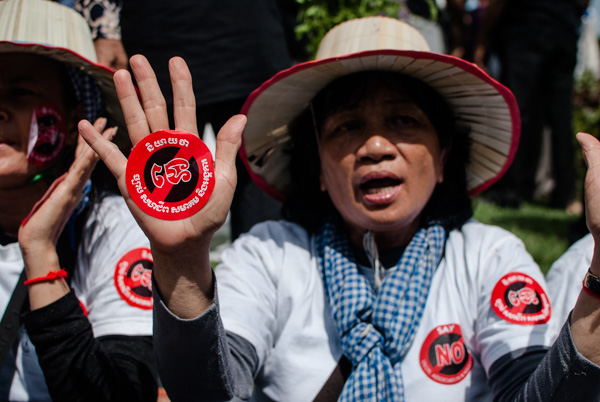PHNOM PENH — The ruling Cambodian People’s Party forced a contentious law regulating the country’s large nongovernmental sector through parliament on Monday, amid widespread opposition and fears that the new bill will be used to stifle dissent and muzzle critics of the government.
The Law on Associations and Non-Governmental Organizations, usually referred to as LANGO, was adopted unanimously by 68 CPP lawmakers after opposition parliamentarians boycotted the vote in protest against the legislation. As the session took place, protesters gathered a few blocks away from the National Assembly, waving banners and wearing stickers amid a heavy police presence.
In recent months dozens of local and international NGOs have called for the law to be scrapped, arguing that the legislation is unnecessary, repressive, and open to abuse. Critics have taken particular aim at provisions requiring mandatory registration for all domestic and international associations and NGOs, and criminalizing any activity by unregistered entities.
The law also includes a provision requiring NGOs to maintain “political neutrality” in their work. Meanwhile, international NGOs can be shut down if they take part in any activities deemed to “jeopardize peace, stability and public order or harm the national security, national unity, culture and traditions of the Cambodian national society.” The bill will now move to the CPP-dominated Senate for approval — in practice, a largely ceremonial process — before being sent to the king for signing into law.
The legislation contained some small concessions to critics, including a reduction in the minimum number of members that NGOs will be required to have before registering. But John Coughlan, a researcher for the human rights group Amnesty International, described the overall impact of the changes as “superficial.” Taken as a whole, he said, the law would likely create a “bureaucratic minefield” for Cambodia’s 3,000-odd NGOs and community associations, as well as giving the authorities sweeping powers to shut down groups on vague or political grounds. “The whole regime it sets out is problematic,” Coughlan said.
The Cambodian government says the law is necessary to prevent criminal activity and the possible use of Cambodian NGOs to funnel terrorist funds into the country. In an April speech, Prime Minister Hun Sen said the government needed to know if money was coming into Cambodia from terrorist groups such as al-Qaida and Islamic State.
“If someone spends money to build a military force, how can we maintain national security?” Hun Sen said, in comments reported by the Cambodia Daily. “We are not making the law to block non-government organizations, we just want you to be transparent.”
Phay Siphan, a spokesman for the Cambodian Council of Ministers, said that Cambodia had a right to regulate the nongovernment sector, and was doing so in order to promote national development. “In 39 articles there is not a single word that the government intends to prevent the freedom of NGOs and freedom of speech,” he said.
But critics are not convinced, saying that laws to crackdown on terrorist activities already exist, and that the legislation will curb the activities of NGOs in key ways. LICADHO, a Cambodian human rights organization, claims that mandatory registration could have a particularly severe impact on the freedom of association of grassroots groups and community-based organizations, which have recently been effective in mobilizing local discontent around issues like deforestation and land-grabs.
Development aid threatened
The law could also impact the activities of large international aid agencies and NGOs that have helped support Cambodia’s reconstruction over the past two decades. On June 9 the European Parliament adopted a resolution warning that the passage of the law could cost the country up to $700 million in development aid annually. “LANGO would place restrictions on budgets, which would threaten the capacity of international NGOs to run cost-effective projects,” the resolution said.
Cambodia’s large nongovernmental sector has been a thorn in the side of Hun Sen and the CPP since the early 1990s, when a United Nations peacekeeping mission facilitated the formation of civil society organizations after years of war and international isolation.
Ou Virak, the president of the Future Forum, a Phnom Penh-based policy institute, said that the CPP has since viewed civil society groups, many of which are funded by foreign governments, as a fifth column seeking to unseat it from power. “They look at NGOs with great suspicion,” he said.
The passage of the new NGO bill coincides with a decline in the popularity of the CPP, following an election in mid-2013 in which the party experienced its largest political setback since 1998.
The opposition Cambodia National Rescue Party, which boycotted Monday’s vote, has deftly capitalized on rising popular discontent about land-grabs, ballooning income inequality and everyday corruption, which continue to plague the country despite impressive economic growth over the past two decades. Although it retains a majority large enough to pass legislation — it currently holds 68 seats in the 123-seat National Assembly — the CPP faces a stiff challenge to win back popular support ahead of the country’s next national election in 2018.
Ou Virak said that the 2013 election and its aftermath confirmed the CPP’s longstanding paranoia about the allegedly subversive role played by Cambodian NGOs. As such, the government was now equipping itself with a legal arsenal to face down a similar turn of events in future.
“They are fearful of a color revolution, or what happened in the Arab world,” he said. “The events of 2013 are feeding into that paranoia.” In addition to the LANGO, the government is readying a suite of potentially repressive laws including a draft trade union law, and another piece of legislation targeting “cybercrimes,” both of which critics say are aimed at trimming back fundamental freedoms.
Despite the sweeping powers granted by the NGO bill, Ou Virak predicted that it was unlikely to have much immediate effect. Unlike China or Russia — both of which have recently launched legal offensives against civil society groups — Cambodia has remained reliant on overseas development assistance, making it necessary to strike a balance between domestic control and international support.
As a result, the law is likely to come into play only if and when Cambodia experiences a surge of public opposition like that seen in 2013. Until then, said Ou Virak, the government’s aim was a system that combined the appearance of pluralistic politics with the perpetuation of its own rule. “It looks like a democracy,” Ou Virak said, “but one they can control.”
Published by Nikkei Asian Review, July 13, 2015







